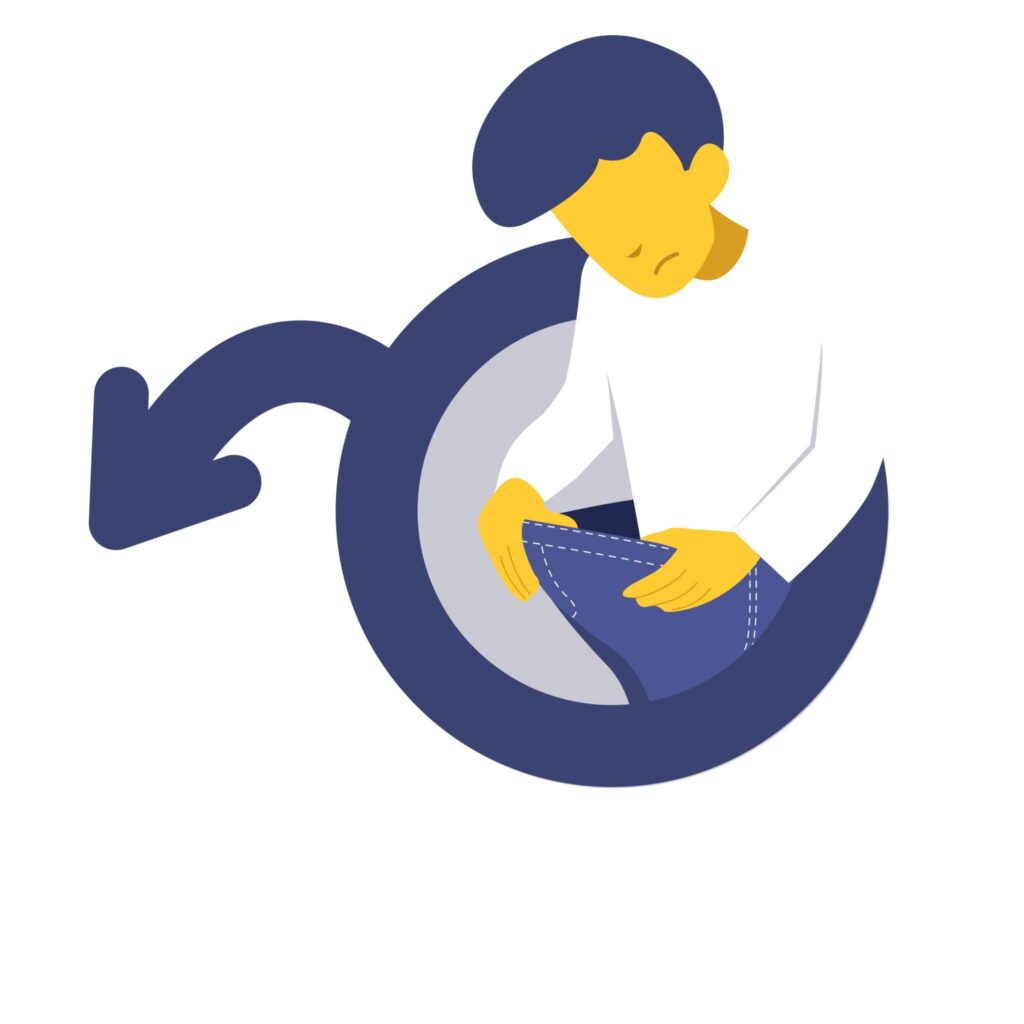ERECTILE DYSFUNCTION
Sexual Disorders

Erectile Dysfunction
Erectile Dysfunction, commonly known as ED, is a challenging condition that affects men’s ability to maintain a firm and satisfying erection during sexual intercourse. In the realm of Ayurveda, this issue is referred to as “Klaibya.” It’s primarily associated with a decrease in vitality and an imbalance in the Vata dosha, one of the fundamental energies in Ayurvedic philosophy. The impact of ED extends beyond the bedroom, often permeating into personal and professional aspects of one’s life.
In personal relationships, it can lead to strains, affecting intimacy and causing emotional distress. In a professional context, ED can erode self-confidence and introduce elevated levels of stress and anxiety. When this condition becomes persistent, it’s vital to seek appropriate Ayurvedic treatment and lifestyle adjustments to restore not only physical well-being but also the emotional and psychological aspects of one’s life, ensuring a holistic and fulfilling existence.
Causes of Erectile Dysfunction
Erectile Dysfunction (ED) can be attributed to a variety of causes, and understanding these factors is essential in addressing this condition effectively. Some of the common causes of ED include:
Lifestyle and Behavioral Factors:
- Smoking: Smoking damages blood vessels, which can impede blood flow to the penis.
Behavioral Factors:
- Excessive Alcohol: Chronic alcohol abuse can lead to nerve damage and hormonal imbalances.
- Lack of Exercise: A sedentary lifestyle can contribute to obesity and other conditions that increase the risk of ED.
- Relationship Issues: Troubled relationships, unresolved conflicts, or poor communication with a partner can lead to stress and anxiety, exacerbating ED.
- Age: While ED can affect men of all ages, it becomes more prevalent as men get older due to natural aging processes.
- Vascular Issues: ED can result from problems with blood flow to the penis. Conditions like atherosclerosis, high blood pressure, and diabetes can damage blood vessels and hinder proper circulation.
- Neurological Disorders: Conditions such as multiple sclerosis, Parkinson’s disease, and spinal cord injuries can disrupt nerve signals essential for achieving and maintaining an erection.
- Hormonal Imbalance: Hormonal issues, especially low levels of testosterone, can contribute to ED.
- Medications: Certain medications, including those for high blood pressure, depression, and prostate cancer, may have ED as a side effect.
- Surgery or Trauma: Surgical procedures and injuries in the pelvic area can damage nerves and blood vessels, leading to ED.
Psychological Factors:
- Stress and Anxiety: High-stress levels, anxiety, or depression can interfere with sexual arousal and performance.
- Performance Anxiety: Fear of not being able to perform well sexually can create a self-fulfilling prophecy of ED.

Symptoms of Erectile Dysfunction
Erectile Dysfunction (ED) is characterized by the consistent inability to achieve or maintain an erection sufficient for sexual intercourse. The primary symptom of ED is the difficulty in achieving a firm and sustained erection. Here are some common symptoms and indicators associated with ED:
- Difficulty Achieving Erection: Men with ED often struggle to achieve an erection, even with sexual stimulation and desire. They may find that their penis does not become sufficiently rigid for intercourse.
- Difficulty Maintaining Erection: Some men may attain an initial erection, but have difficulty maintaining it long enough to engage in sexual activity.
- Reduced Sexual Desire: ED can be accompanied by a decrease in libido or sexual desire. Men may find themselves less interested in sexual activities.
- Premature Ejaculation: In some cases, ED may lead to premature ejaculation, where the climax occurs shortly after achieving an erection, often before desired.
- Emotional Distress: ED can cause emotional and psychological distress, leading to feelings of inadequacy, low self-esteem, frustration, and anxiety, especially related to sexual performance.
Erectile Dysfunction Ayurvedic Treatment
Vajikarana is a significant aspect of Ayurveda dedicated to enhancing male sexual strength and well-being. It encompasses various elements, including dietary adjustments, specific exercises, meditation, and relaxation techniques, aimed at helping men achieve their peak physical and mental health, thereby conquering erectile dysfunction.
In Ayurveda, the preservation and nourishment of Shukra Dhatus (reproductive tissues) are of paramount importance for the proper functioning of the male system. This holistic approach ensures not only physical vitality but also addresses the mental aspects of an individual.
Ayurvedic medicines play a pivotal role in treating erectile dysfunction. They are designed to not only enhance a person’s physical health but also promote a balanced mental state, crucial for overall well-being.
Ayurveda’s approach revolves around Dhatu poshan, focusing on the complete nourishment of all seven Dhatus, which ultimately leads to the resolution of erectile dysfunction. This well-rounded strategy reflects Ayurveda’s commitment to addressing both the physical and mental aspects of male sexual health.


